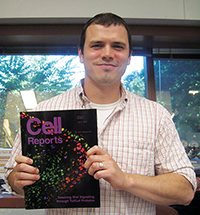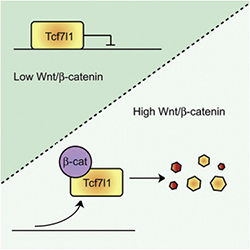September 18, 2013
Signal Transduction Factors in Breast Cancer
Brian Shy, an MD/PhD student in the Department of Biochemistry and Molecular Genetics at the UIC, was selected as a CBC Scholar in 2013. Results of Brian’s work on the role of signal transduction factors in breast cancer were recently published and featured on the journal cover in the July 11, 2013 issue of Cell Reports, “Regulation of Tcf7l1 DNA Binding and Protein Stability as Principal Mechanisms of Wnt/β-Catenin Signaling.”
 Brian Shy, an MD/PhD student in the Department of Biochemistry and Molecular Genetics at the University of Illinois at Chicago (UIC), was selected as a CBC Scholar in 2013. He studies the mechanisms of Wnt signaling pathway in the maintenance of pluripotency in embryonic stem cells (ESCs). Through the collaboration with Dr. Kathleen Goss’s lab at the University of Chicago, Brian (right) and his colleagues in Dr. Brad Merrill’s lab at UIC discovered that a similar mechanism exists in a group of poorly differentiated breast cancers that currently lack effective therapies. Results of Brian’s work on the role of signal transduction factors in breast cancer were recently published and featured on the journal cover in the July 11, 2013 issue of Cell Reports, “Regulation of Tcf7l1 DNA Binding and Protein Stability as Principal Mechanisms of Wnt/β-Catenin Signaling.”
Brian Shy, an MD/PhD student in the Department of Biochemistry and Molecular Genetics at the University of Illinois at Chicago (UIC), was selected as a CBC Scholar in 2013. He studies the mechanisms of Wnt signaling pathway in the maintenance of pluripotency in embryonic stem cells (ESCs). Through the collaboration with Dr. Kathleen Goss’s lab at the University of Chicago, Brian (right) and his colleagues in Dr. Brad Merrill’s lab at UIC discovered that a similar mechanism exists in a group of poorly differentiated breast cancers that currently lack effective therapies. Results of Brian’s work on the role of signal transduction factors in breast cancer were recently published and featured on the journal cover in the July 11, 2013 issue of Cell Reports, “Regulation of Tcf7l1 DNA Binding and Protein Stability as Principal Mechanisms of Wnt/β-Catenin Signaling.”
 The Cell Reports paper shows that Tcf7l1 activity is regulated in ESCs by a different mechanism than had been previously proposed for other members of the Tcf/Lef family of transcription factors. Typically, Wnt signaling increases the levels of β-catenin protein in cells and β-catenin binding to Tcf/Lef proteins had been thought to convert Tcf proteins into transcriptional activators. However, Brian and his collaborators found that, in the case of both ESCs and breast cancer cells, β-catenin does not form a trans-activation complex with Tcf7l1. Instead, β-catenin inactivates Tcf7l1 by removing it from DNA and stimulating Tcf7l1 protein degradation (see graphical abstract). This novel mode of Tcf7l1 activity regulation, and thus of transcription, may provide insights into the role Wnt signaling plays in pluripotency of ESCs and in breast cancer cells. The group hopes that defining this mechanism will further open up new treatment strategies for these aggressive tumors.
The Cell Reports paper shows that Tcf7l1 activity is regulated in ESCs by a different mechanism than had been previously proposed for other members of the Tcf/Lef family of transcription factors. Typically, Wnt signaling increases the levels of β-catenin protein in cells and β-catenin binding to Tcf/Lef proteins had been thought to convert Tcf proteins into transcriptional activators. However, Brian and his collaborators found that, in the case of both ESCs and breast cancer cells, β-catenin does not form a trans-activation complex with Tcf7l1. Instead, β-catenin inactivates Tcf7l1 by removing it from DNA and stimulating Tcf7l1 protein degradation (see graphical abstract). This novel mode of Tcf7l1 activity regulation, and thus of transcription, may provide insights into the role Wnt signaling plays in pluripotency of ESCs and in breast cancer cells. The group hopes that defining this mechanism will further open up new treatment strategies for these aggressive tumors.
In the near future, Brian would like to identify the enzymes responsible for Wnt/ β-catenin/Tcf7l1 interactions to lay grounds for future drug discoveries that would interfere with the pathway. He will also continue studying other proteins in the Tcf/Lef family. “Being a CBC Scholar has given me an amazing opportunity to interact with a great group of graduate students from many disciplines and all three CBC universities. The generous funding from the CBC Scholars Program allowed me to travel and interact with my UChicago collaborators face-to-face,” said Brian.
Image Credits: Brian Shy, CBC; Graphical Abstract, adapted from: Shy BR, Wu CI, Khramtsova GF, Zhang JY, Olopade OI, Goss KH, Merrill BJ. Regulation of Tcf7l1 DNA Binding and Protein Stability as Principal Mechanisms of Wnt/β-Catenin Signaling. Cell Rep. 2013 Jul 11;4(1):1-9. (PubMed)
